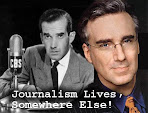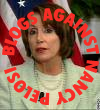Golden State: Hewitt Votes for Ignorance (Yet Again)
"Hugh "Don't Dare Tell Me Anything I Don't Want to Know" Hewitt tonight posts a radio exchange he had with Time Baghdad Bureau Chief Michael Ware, a journalist whose fair-mindedness evidently has landed him in Hewitt's doghouse."
Golden State blog gets one thing right, when he encourages everyone to read the interview posted at Radio Blogger.
What's to say? The comments to Golden's post are worthy of reading. Blogoland reacted to the interview in part with, "I am in awe of Mr. Hewitt's bravery. And just a few days ago, we hear, Hugh actually got on a PATH train that went RIGHT THROUGH Ground Zero. Somehow, some way, he survived."
I listen to Hewitt on my drive home each weekday and enjoy it. I heard 75% of the interview and have read the transcript, so I guess it comes down to what you heard, how you heard it or read it. Could you have listened and heard the implication? I suppose, as he was saying it you could, but then you wouldn't be listening as intently as you could. My radar went up when he began talking about where he was sitting at the time and it didn't strike me that he was implying he was a "frontline warrior." Blogo updates later having read some Hewitt posts, and says "he (Hewitt) is really just saying that the "front lines" are everywhere: not just where people are getting blown up on a daily basis. Can't argue with that logic."
One of the first comments at Golden is from a user named Asinistra (appears to be a journalism professor of some sort) and says, "Michael, I don’t know that I’ve ever seen a better side-by-side comparison between the values and talents of a raw propagandist and a real reporter as in the Hewitt/Ware interview."
"Where HH asks: Is Michael Ware doing a good job as a journalist? I will ask: Is Donald Rumsfeld doing a a good job as Secretary of Defense? And if he’s doing a bad job and endangering the lives of American troops, whose job is it to report on the job he’s doing?"
From his opening remark it is obvious how he regards the interviewer and interviewee, so no point belaboring that. The "where HH asks:" and what follows is interesting as it will be used as an instruction tool for his students. If my understanding is correct he is defending a journalist with an example of a question to a more appropriate interviewee and what that journalists job/duty it is to then do; report the mediocrity or endangerment of troops lives. Afterall it is in part, that the soldiers are in harms way because of the Secretary of Defense.
What I am having difficulty with is, why change the question/subject? Why is Donald Rumsfeld the one you should interview when the gist of Hewitt's interview is the question of whether embedding so to speak, with jihadists results in unbiased or accurate reporting? Does this switch around by Asinistra lean in favor of Hewitt's argument? Isn't this part of the point he is trying to make?
Ultimately, the journalist did not put these soldiers where they are, but isn't the journalist to be held to any type of journalistic standard?
As much as I know it, one piece of that standard is to report the facts in an as unbiased way as possible; another, if I am correct is to be an impartial witness. At the least, these are the two standards that Hugh Hewitt is driving at.
Michael Ware sounds as though he admires these people, not in an "oh wow your swell" type of way, but that the respect or esteem he holds the jihadists/insurgents is no less than that which he holds the coalition soldiers. But that is just my opinion and I do not care if it is shared or not.
The point that Hewitt makes about Eason Jordan goes over the head of Ware, or at least he doesn't see any possiblity of this in his situation because he's a journalist in the thick of it. He compares being embedded with a U.S. unit to that of being with an insurgent or jihadi unit; when he clearly speaks of having been in some precarious spots that could have lead to his assassination. When reporting negatively on U.S. units is one beheaded? He is comparing apples to oranges. When he relates the episode of the Zarqawi instructional tape as an example of pulling no punches; is that the same as telling it like it is/was when on the ground with these thugs and reporting that they raped, beheaded and ran roughshod so to speak? Do Iraqi government people at his door represent the same threat to him as jihadis? He speaks as though they are of the same stripe, but are they?
How does one "couch" statements, yet still get the point across without the bad guy catching on? The battle(s) for Iraq are still not over, yet why is it lost? How is Ware so sure that it is lost? Is it because there are divisions worth of these guys?
Ware speaks of the Western governments misleading citizens, "Now I cannot begin to tell you how much the American people, not to mention the Brits and the Aussies back home, have been significantly misled about the nature of the enemy." How does this speak of intentional misleading, I'm not saying it's not (although I don't think that is the entire story), how is he so sure? As he indicates they are not just "one homogenous group" and they have "different motivations" I wonder how he can then be so convinced they are winning? I think they are losing, he thinks they are winning, yet know one knows until it's over.
I don't recall ever thinking we were looking at one cohesive jihadist/insurgent army. It has always seemed a mish mosh of those that in some instances would be opposed, but work together somewhat against a shared enemy.
Finally, I believe it is understood that one can have a certain relationship with ones captors, where they empathize with them. Why wouldn't Ware be subject to this type of thing due to his experiences?
I think Mr. Hewitt has some very good points. I personnaly think he took it too easy on Mr. Ware, although how he would have done it differently I don't know. I don't think Ware is intentionally trying to hide something or that he is actually hiding something. I just don't think he can view himself in the perspective that Hewitt is concerned with. He can see what he sees, but cannot come to grips with it in any sense with which he could objectively evaluate and respond to what is being asked. As with most in the media, his writings must be taken with a grain or two of salt as well. Regardless of how well they think they're doing, it will always be up to the reader to apply the filters. Which is unfortunate because there is no guarantee our filters are always functioning properly.
Unfortunately I am in an environment that is not conducive to keeping one train of thought for longer than a few minutes at a time. My writing and that which I am trying to get across are often fractured; for this I apologize. It's like a zoo here.
"How did it come to pass that an opposition's measure of a president's foreign policy was all or nothing, success or "failure"? The answer is that the political absolutism now normal in Washington arrived at the moment--Nov. 7, 2000--that our politics subordinated even a war against terror to seizing the office of the presidency." - Daniel Henninger - WSJ 11/18/05
------------------------------------------------
------------------------------------------------
"the slovenliness of our language makes it easier for us to have foolish thoughts." - George Orwell
------------------------------------------------
------------------------------------------------
Friday, March 31, 2006
Golden State: Hewitt Votes for Ignorance (Yet Again)
Posted by a.k.a. Blandly Urbane at 12:43:00 PM
Golden State: Hewitt Votes for Ignorance (Yet Again)
2006-03-31T12:43:00-07:00
a.k.a. Blandly Urbane
Subscribe to:
Comment Feed (RSS)





















